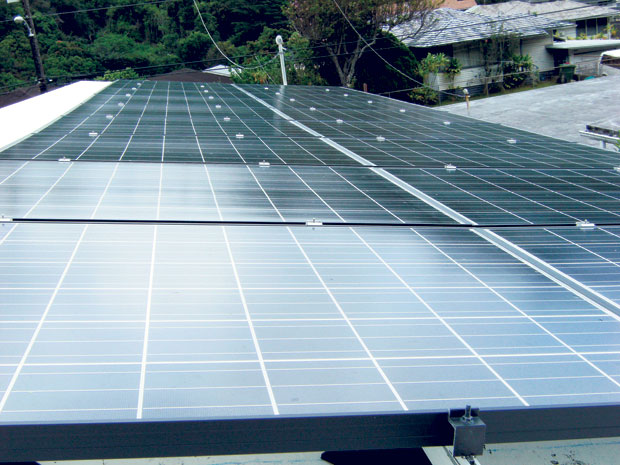Pacific Islands Construction has a goal to help those considering a photovoltaic system for their home become more knowledgeable. Having knowledge is a great equalizer between the buyer and seller, but generally the buyer is at a great disadvantage. The following information is provided so that buyers may be better informed:
1. A silicon solar cell’s performance dramatically declines when it reaches a temperature higher than 25 degrees Celsius (77 degrees Fahrenheit). How modules are installed on the roof matters when it comes to ventilation on the under-side of modules.
2. Dirty modules and corroded wires or connections will affect energy production.
3. A reduction in cell thickness and poor quality in construction have been recent problems. The lack of robustness of solder connections in these fragile cells and other stress factors have caused micro fractures and hot spots. Recent observations show what appear to be trails across the cells where the solder has gotten so hot over the fracture that a reaction has occurred, blemishing the cells and lowering energy output.
4. Cells within the modules are wired in series, and the modules are no better than the weakest cell. Energy production is greatly reduced when low-quality cells are used and quality control is lax.
5. PV manufacturers are not profitable because of market conditions.
Companies are either leaving the industry or going bankrupt. Many of those still in the industry have cut back on quality to survive. Customers should be very careful when selecting a manufacturer. Even trusted names have lowered in quality.
6. Efficiency ratings of modules have been engineered by manufacturers to cast their product in the best light. Every manufacturer would like you to believe that its product is the best, and salespeople will point to these tests as proof. The industry does not oversee what is actually coming off the assembly line in comparison to what was tested.
7. The system will generally be installed on your roof, and that requires careful consideration. Are the correct flashing details for your type of roofing being used? Has the racking system been tested to meet high winds or just rated? Are the structural elements of roof assembly engaged in securing the system? Are the conduits and wiring all properly secured? Customers need to check the installations performed by contractors they are considering.
8. Warranties are written as sales tools and have many limitations to protect the manufacturer. Most people trust the warranties without having read them. Warranties are not guarantees.
9. As a general rule, most systems are sold without any maintenance plans, and owners believe that the warranties will protect them from any future problems. Pacific Islands Construction provides free maintenance with every system purchase because the company knows that this is in the best interest of the equipment and installation. To protect the long-term investment, it is critical that these systems are serviced and protected, otherwise repairs not covered by the warranties will be quite expensive.
If you are looking to make an informed decision, call Pacific Islands Construction at 841-7756 to talk to one of its trained consultants. They can provide you with answers to many of your questions without the sales gimmicks.
The company believes that an informed consumer will make a better decision when purchasing a solar energy system. If you believe in quality, let Pacific Island Construction show you why Kyocera is the best choice for solar. Since the company also is a licensed roofer/contractor, it can ensure the best installation on your roof.
Call Pacific Islands Construction or visit the website at pacificislandsconstruction.net.
contact // 841-7756
web // Pacificislandsconstruction.net

See more articles from: Pacific Islands Construction